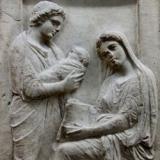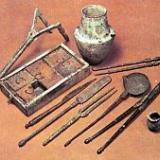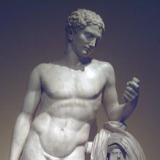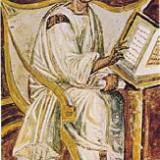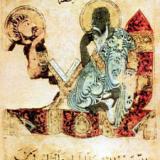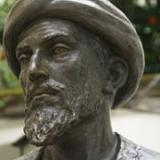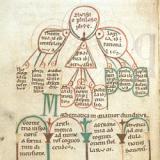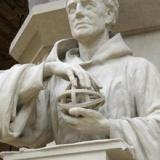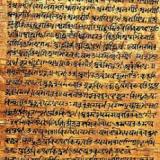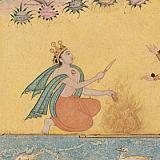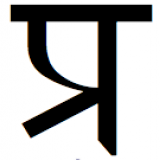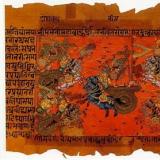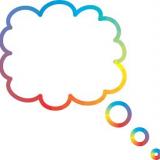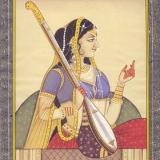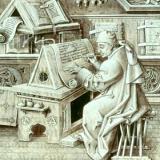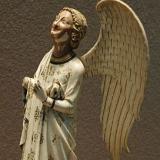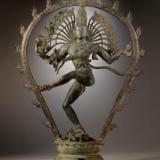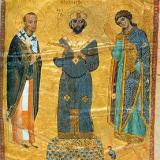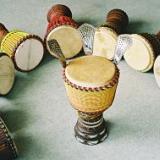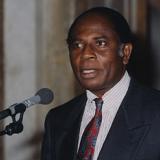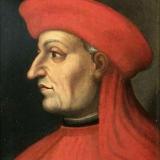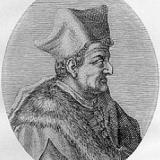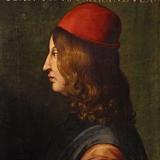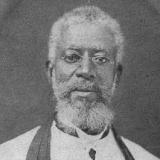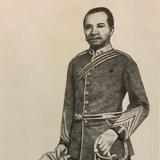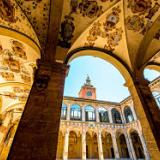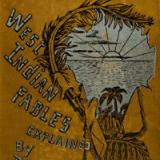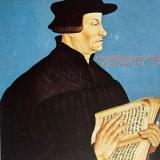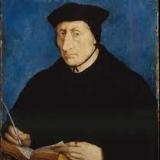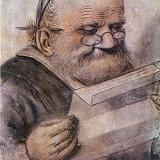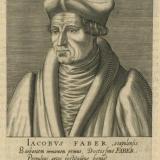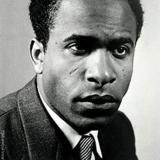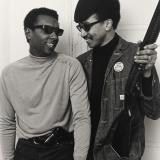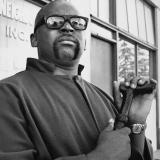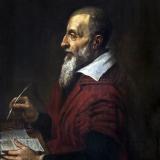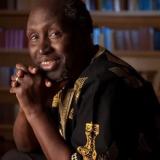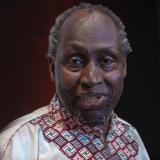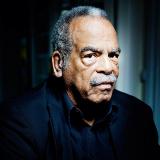Language
Posted on
In this episode, Peter Adamson discusses the sophists, teachers of rhetoric in ancient Athens, looking especially at the contributions of Protagoras and Gorgias.
Posted on
Peter discusses Plato's contribution to the philosophy of language, the Cratylus, a dialogue which uncovers a theory of Heraclitean flux hidden within ancient Greek.
Posted on
Peter discusses Aristotle’s pioneering work in logic, and looks at related issues like the ten categories and the famous “sea battle” argument for determinism.
Posted on
Peter looks at the interaction between rhetoric and philosophy in the Roman Empire, discussing authors like Quintilian, Lucian and Themistius.
Posted on
Neoplatonism is fused with Christianity by the pseudonymus author known as Dionysius. Peter looks at his Divine Names, a monument to God’s transcendence.
Posted on
In On the Teacher and On Christian Doctrine, Augustine argues that language cannot produce knowledge and explains how to interpret Scriptural language.
Posted on
A group of mostly Christian philosophers transpose the practices of antique Aristotelian philosophy to 10th century Baghdad.
Posted on
The great Jewish thinker and legal scholar Maimonides, and the philosophical ideas in his Mishneh Torah and Guide for the Perplexed.
Posted on
Hugh of Saint Victor and other scholars of the same abbey combine secular learning with spirituality.
Posted on
Roger Bacon extols the power of science based on experience and uses a general theory of "species" to explain light and vision.
Posted on
The pioneering Sanskrit grammar of Pāṇini and its implications for philosophy of language.
Posted on
The modistae explore the links between language, the mind, and reality.
Posted on
In the Mīmāṃsā school’s founding text, Jaimini systematizes Vedic ritual and explores its theoretical basis.
Posted on
The Mīmāṃsā school put their faith in sense experience, and argue that the Veda, and hence language itself, had no beginning.
Posted on
Mīmāṃsā expert Elisa Freschi speaks to Peter about philosophical issues arising from the interpretation of the Veda.
Posted on
The grammarian Bhartṛhari argues that the study of language is the path to liberation, because the undivided reality underlying language is brahman.
Posted on
How the language of thought relates to spoken and written language, according to William of Ockham.
Posted on
The scholastics discuss the ambiguity of terms, the nature of logical inference, and logical paradoxes, and play the game of “obligations.”
Posted on
Bharata’s Nāṭya-Śāstra and later works from Kashmir explore the idea of rasa, an emotional response to drama, music, and poetry.
Posted on
The hipster’s choice for favorite scholastic, John Buridan, sets out a nominalist theory of knowledge and language, and explains the workings of free will.
Posted on
The great Buddhist thinker Dignāga argues that general concepts and language are mere constructions superimposed on perception.
Posted on
Be surprised by how many philosophical problems arise in connection with angels (how many can dance on the head of a pin is not one of them).
Posted on
Philosophy is put into practice in Kashmir Śaivite Tantra and Buddhist Tantra.
Posted on
Psellos and other experts in rhetoric explore how this art of persuasion relates to philosophy.
Posted on
An introduction to the “ethnophilosophy” approach inaugurated by Placide Tempels, its promises and potential pitfalls.
Posted on
As the twentieth century draws to a close, the critique of ethnophilosophy gives way to approaches that continue to privilege the study of precolonial traditions, including the approach promoted by Kwasi Wiredu (pictured).
Note: we dedicate this episode to the memory of Kwame Gyekye, who passed away earlier this month.
Posted on
Coluccio Salutati and Leonardo Bruni combine eloquence with philosophy, taking as their model the refined language and republican ideals found in Cicero.
Posted on
Lorenzo Valla launches a furious attack on scholastic philosophy, favoring the resources of classical Latin.
Posted on
Jill Kraye returns to the podcast to discuss the nature of humanism, its relation to scholasticism, and its legacy.
Posted on
Pico della Mirandola argues for the harmony of the ancient authorities, draws on Jewish mysticism, and questions the value of humanist rhetoric.
Posted on
From his time in Liberia to his later concentration on the reform of African American culture, Alexander Crummell identifies progressive “civilization” as a means of liberation.
Posted on
Africanus Horton looks toward a future of self-government for West Africa beyond slavery and colonialism.
Posted on
The blurry line dividing humanism and scholastic university culture in the Italian Renaissance.
Posted on
John Jacob Thomas argues for self-government in the English colonies of the Caribbean but his fellow Trinidadian Frederick Alexander Durham recommends repatriation to Africa instead.
Posted on
Rudolph Agricola, Juan Luis Vives and other humanist scholars spread the study of classical antiquity across Europe and mock the technicalities of scholastic philosophy.
Posted on
The Swiss theologian Zwingli launches the Reformation in Switzerland, but clashes with Luther and more radical Protestants.
Posted on
We begin to look at philosophy in Renaissance France, beginning with humanists like Budé and the use of classical philosophy by poets du Bellay and Ronsard.
Posted on
In his outrageous novel about the giants Pantagruel and Gargantua, Rabelais engages with scholasticism, humanism, medicine, the reformation, and the querelle des femmes.
Posted on
Jacques Lefèvre d’Étaples and Julius Caesar Scaliger fuse Aristotelianism with humanism to address problems in logic and literary aesthetics.
Posted on
Frantz Fanon combines psychoanalysis and existential phenomenology to diagnose neuroses deriving from the colonial condition.
Posted on
How the controversial slogan “black power,” used by activists like H. Rap Brown and Stokely Carmichael (pictured), relates to ideas of militancy, separatism, and the power of language.
Posted on
The Pan-Africanist philosopher Maulana Karenga defends the importance of cultural revolution and invents the holiday Kwanzaa.
Posted on
Joseph Scaliger, Isaac Casaubon, and Guillaume du Vair grapple with history and the events of their own day.
Posted on
Toni Morrison, Alice Walker, and Maya Angelou explore the themes of black feminism (or “womanism”) in their fiction.
Warning: this episode contains discussion of sexual violence and suicide.
Posted on
How one of Kenya's greatest writers came to argue that African literature should be written in African languages.
Posted on
The great Kenyan writer Ngũgĩ wa Thiong'o joins us to speak about his career, his influences, and the power and politics of language.
Posted on
Poet, novelist, playwright and philosopher Edouard Glissant, his theory of "creolization", and the Creolists who were influence by him.
Posted on
Fray Luis de Leon, Antonio Nebrija, Beatriz Galindo and other scholars bring the Renaissance to Spain.


